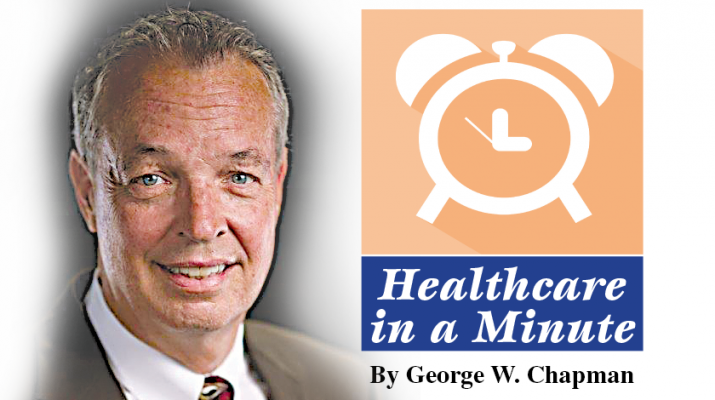 Artificial intelligence, like ChatGPT (Generative Pre-trained Transformer), is being met by providers with the same guarded optimism and trepidation as the now firmly entrenched electronic medical record.
Artificial intelligence, like ChatGPT (Generative Pre-trained Transformer), is being met by providers with the same guarded optimism and trepidation as the now firmly entrenched electronic medical record.
But unlike the electronic medical record, which was slowly and painfully incorporated into healthcare over several years, chatbots will become an integral part of healthcare seemingly overnight.
Google’s chatbot scored 85% on a practice medical licensing exam. Another chatbot scored 90% on a law bar exam.
As with the electronic medical record, if AI is not used properly, there are concerns over privacy, equity, safety and quality. Proponents of chatbots in healthcare see win-win scenarios for providers and
their patients.
Chatbots will relieve providers and their support staff of several menial administrative tasks, thereby freeing them to spend more time with their patients and critical clinical issues.
Industry experts believe AI will increase access, improve the patient experience, lower costs and prevent many heretofore frustrated physicians and nurses from leaving healthcare altogether.
Basically, chatbots can: automatically refill prescriptions; provide basic, necessary medical information; check symptoms; assist with coverage and claims; instantly respond to queries; recommend wellness programs; provide medical assistance; and schedule appointments. And all this 24/7.
Physician Compensation Declines
 According to a survey of 31,000 full time physicians by Doximity, the average physician compensation declined 2.4% last year. (It went up 3.8% in 2021.) The decline occurred despite a predicted MD shortage, a significant rise in operating costs, and MD burnout. According to the AMA, when adjusted for inflation, Medicare reimbursement declined 22% between 2001 to 2012. (Commercial carriers tend to follow suit.)
According to a survey of 31,000 full time physicians by Doximity, the average physician compensation declined 2.4% last year. (It went up 3.8% in 2021.) The decline occurred despite a predicted MD shortage, a significant rise in operating costs, and MD burnout. According to the AMA, when adjusted for inflation, Medicare reimbursement declined 22% between 2001 to 2012. (Commercial carriers tend to follow suit.)
According to Doximity, the highest paid specialties are:
• Neurosurgery, $746,000
• Thoracic surgery, $668,000
• Orthopedic surgery, $605,000
• Plastic surgery, $539,000
• Oral and maxillofacial surgery, $538,000
• Vascular surgery, $534,000
• Cardiology, $527,000
• Radiation oncology, $516,000
• Gastroenterology, $486,000
• Radiology $485,000.
Medicare Hospital Fund in Jeopardy
The trustees of the Medicare hospital trust fund have projected the fund will be depleted by 2031. Incoming Medicare taxes after that will be insufficient to rebuild a reserve. Thanks to the InflationReduction Act, which fixes monthly insulin costs at $35 and authorizes Medicare to negotiate a few drug prices effective 2026, the fund would have been depleted three years sooner in 2028. So that begs the obvious question: if the projected savings in insulin costs and a dozen or other drugs can push the depletion date out three years, why not let Medicare negotiate all drug prices? Answer: the drug lobby.
Putting Off Care
Even though 90% of us have health insurance, many are saddled with increasingly higher deductibles and co-pays as employers continue to shift more of the costs to employees. Not surprisingly, most consumers are clueless about their benefits and out-of-pocket costs until they are confronted with a health crisis. Healthcare in our country is confusing, frustrating and terribly expensive. Healthcare debt is still the No. 1 reason for bankruptcy. A recent survey of over 1,000 consumers by a national consulting firm revealed:
• Over 50% of respondents are concerned about their ability to pay for a major healthcare event;
• 65% said they are not able to afford a new $250 a month expense to manage a chronic condition and related medications;
• 64% said they would delay or skip necessary care if they were unsure of their ultimate out of pocket responsibility.
Ironically, putting off care to save money can result in even higher costs to patients as symptoms not treated early worsen over time until there is an acute medical crisis. This non adherence eventually impacts quality, outcomes, productivity and even provider burnout. Hospitals have been slow to display mandatory pricing information on their websites. Once in compliance, this should help consumers calculate what their insurance will pay and then what they will owe out of pocket for selected procedures.
Exchange Rates Up 3.4%
According to an analysis by the Robert Wood Johnson Foundation, health insurance premiums on the federal exchange increased about 3.4% this year. The enhanced subsidies provided by the federal government resulted in record breaking enrollment. The number of insurance companies on the exchange increased to 232. Premiums on the exchange actually dropped 2.2% from 2019 through 2022. The reasons for the 3.4% increase this year are: high inflation beginning last year; uncertainly over enhanced income-based subsidies (the Inflation Reduction Act eventually continued the enhancement through 2025); the end of continuous coverage requirements through the pandemic; uncertainty over the lingering impact of COVID19 and newer strains. Most commercial insurance premiums increased for the very same reasons.
Uber More Than Rides
 Uber has been providing non-emergent medical transport (NEMT) since 2018. Uber’s newest venture is delivering prescriptions, over-the-counter drugs and healthy foods. Providers will use the same Uber platform they already use to arrange rides for their patients. Patients who lack their own transportation are more likely to be non compliant by missing medical appointments or by not taking their meds. Uber ride and prescription delivery services are becoming more popular with providers under value-base, contracts which reward providers for positive patient outcomes.
Uber has been providing non-emergent medical transport (NEMT) since 2018. Uber’s newest venture is delivering prescriptions, over-the-counter drugs and healthy foods. Providers will use the same Uber platform they already use to arrange rides for their patients. Patients who lack their own transportation are more likely to be non compliant by missing medical appointments or by not taking their meds. Uber ride and prescription delivery services are becoming more popular with providers under value-base, contracts which reward providers for positive patient outcomes.
HIPAA Privacy Violations
Health Affairs analyzed over 3,700 hospital webpages and found just about all of them incurred at least one third-party data transfer. Specifically, 98.6% had at least one third-party data transfer and 94.3% had at least one third-party cookie. The median number of third-party transfers was a whopping 16. The leading culprits were Alphabet 98.5%; META 55.6%; Adobe 31.4%; and ATT 24.6%. Angry consumers, feeling their privacy has been violated, have filed individual and class action lawsuits against hospitals for sharing their personal information with these website trackers.
Another Attack on the ACA
 The Affordable Care Act mandates that insurers offer free preventive services including screening for breast cancer, cervical cancer, diabetes and vision testing for preschoolers. Inexplicably, judge Reed O’Connor, the same judge who tried to kill the entire hugely popular act in 2018, has ruled that some of the mandated free preventive services are illegal. Really? Who brought this suit? Just about every commercial carrier has vowed to continue with free preventive services because it saves lives and money in the long run.
The Affordable Care Act mandates that insurers offer free preventive services including screening for breast cancer, cervical cancer, diabetes and vision testing for preschoolers. Inexplicably, judge Reed O’Connor, the same judge who tried to kill the entire hugely popular act in 2018, has ruled that some of the mandated free preventive services are illegal. Really? Who brought this suit? Just about every commercial carrier has vowed to continue with free preventive services because it saves lives and money in the long run.
 George W. Chapman is a healthcare business consultant who works exclusively with physicians, hospitals and healthcare organizations. He operates GW Chapman Consulting based in Syracuse. Email him at gwc@gwchapmanconsulting.com.
George W. Chapman is a healthcare business consultant who works exclusively with physicians, hospitals and healthcare organizations. He operates GW Chapman Consulting based in Syracuse. Email him at gwc@gwchapmanconsulting.com.

